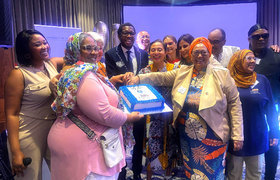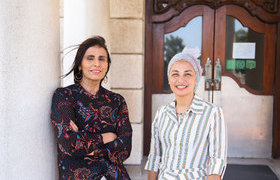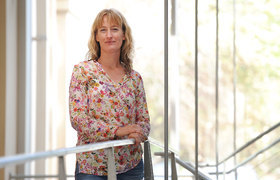Leaving no one behind as UCT is transforming disability inclusion
20 May 2025 | Story Myolisi Gophe. Photos Lerato Maduna. Voice Cwenga Koyana. Read time 8 min.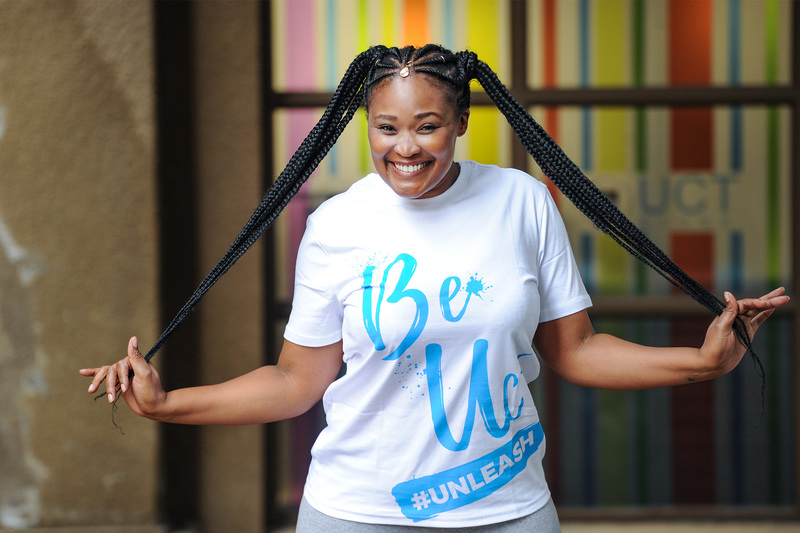
In the University of Cape Town’s (UCT) Vision 2030 lies a powerful commitment: leave no one behind. While this mantra may sound aspirational, for the Disability Service, it is an everyday reality they are working tirelessly to bring to life.
Over the past decade, the department has transformed access and inclusion around disability – one student, one staff member, one alumnus, one policy, and one mindset at a time.
“We’ve come a long way,” recalled Edwina Ghall, the manager of the Disability Service in the Office for Inclusivity & Change (OIC). “From where we were in 2008, the university has made massive strides. But inclusion isn’t a destination – it’s a continuous process.”
Where the journey began
According to Ghall, the transformation journey began with the development of infrastructure designed to be universally accessible. A 2014 physical accessibility audit of 31 buildings acted as a catalyst, sparking renovations of older facilities and informing the inclusive design of new buildings. Importantly, this approach extends beyond wheelchair access to include features that support both visible and invisible disabilities.
Student residences were also adapted in line with this commitment. “A number of UCT residences were modified specifically to support students who need carers,” Ghall explained. “We’ve had students with multiple disabilities, including those who need assistance with cooking, dressing, or even clearing their airways. Without that support, they simply couldn’t fully engage in student life.”
“The Deaf community is one of the most marginalised, and we’re proud to give their language the recognition and visibility it deserves.”
The university appointed its first full time South African Sign Language interpreter in 2012. Over time, Sign Language interpretation services have been integrated into high-profile university events such as graduation ceremonies, open days, and first-year receptions. Through collaboration with the Multilingualism Education Project (MEP), South African Sign Language has been officially recognised as one of the institution’s developing languages.
“This is part of our transformative language policy,” explained Lesego Modutle, a disability advocacy specialist in the Disability Service. “The Deaf community is one of the most marginalised, and we’re proud to give their language the recognition and visibility it deserves.”
Inclusion beyond infrastructure
But inclusion isn’t only about buildings or services – it’s about people. One of the key areas the university has focused on is shifting attitudes and promoting a culture of disability inclusion.
A major turning point came with the launch of the Disability Declaration Drive. For years, stigma discouraged both staff and students from disclosing their disabilities. But the declaration campaign changed that.
“We trained both peers and managers on what it means to create inclusive environments,” explained Ghall. “As a result, we’ve seen a rise in disability declarations, especially among staff. This helps us ensure we’re not just recruiting but also retaining and supporting staff with disabilities.”
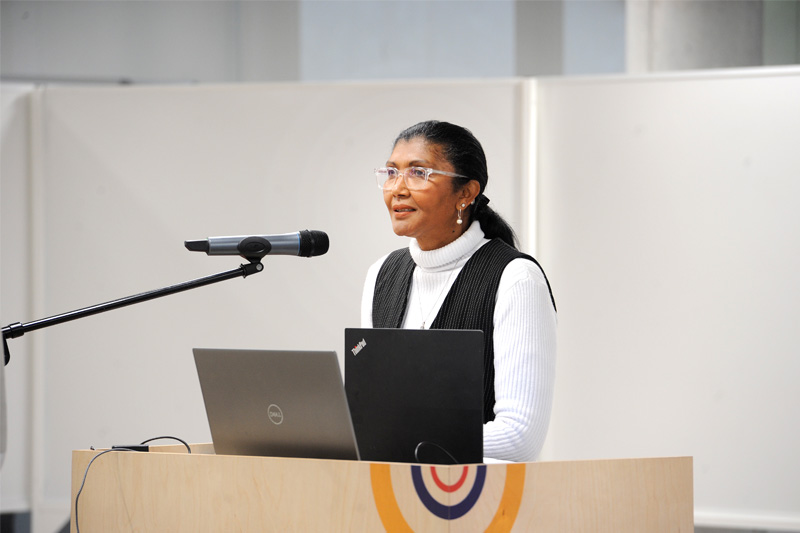
The student numbers also tell a story of change, and, according to the Disability Service, this year has seen the highest number of students registering for support. “Students now feel more confident seeking support and services. That’s a big win.”
A culture of care
One of the more remarkable and perhaps lesser-known services the university offers is personal care support for students with complex medical conditions. This support goes far beyond academics.
Ghall shared a story of a student with tracheostomy who uses a wheelchair and lives with multiple disabilities. “Without her full-time carer, who clears her airways and manages her medical needs, she wouldn’t be able to participate in the classroom. We don’t just support learning, we support life.”
“We don’t just support learning, we support life.”
To sustain these efforts and shift institutional culture, the Disability Service launched an innovative online training programme, titled “Transformation Through Disability Inclusion”. Developed in partnership with internal experts, the course offers modules on advocacy, physical access, mental health, reasonable accommodations, and more.
Yet uptake has been slow.
“One of our biggest challenges is that people don’t want to do the training,” noted Ghall. “We have this beautiful, comprehensive resource, but we’re still ‘preaching to the converted’.”
Ghall and her colleagues believe the training should be mandatory, especially for line managers and staff who work directly with students. “There are invisible disabilities all around us. Unless people make the effort to learn, we’re never going to break down misconceptions.”
Partnerships that drive progress
As it has always been the case, transformation doesn’t happen in isolation. As such, the Disability Service has built strong collaborative relationships across the university and beyond.
The Faculty of Health Sciences, in particular, stands out as a champion of disability inclusion. A dedicated “care team”, including the deputy dean and academic staff, holds regular check-ins with students who have disabilities, ensuring they receive consistent, responsive support.
Other internal partners include the Centre for Innovation in Learning and Teaching (CILT), which helped co-develop the disability inclusion training, and the MEP, which was instrumental in mainstreaming South African Sign Language.
The department maintains strong external partnerships with a range of organisations that support persons with disabilities. These include organisations focused on neurological conditions, mobility assistance, and support for the Deaf community, as well as institutions serving individuals with visual impairments and those who are blind. Through these collaborations, the department strengthens its capacity to promote accessibility and inclusion.
“When people have held a belief for 30 years, it’s hard to come in and tell them they’re wrong.”
This work is further supported by strong internal collaboration across various PASS departments, all of which contribute to providing holistic, wraparound support for students with disabilities.
Despite the progress, challenges remain. The biggest of them all is changing mindsets.
“When people have held a belief for 30 years, it’s hard to come in and tell them they’re wrong,” said Modutle. “Students are often more open and easier to work with. With staff, there’s more resistance.”
Another challenge is funding. Despite the university’s commitment to inclusion, some of the Disability Services’ roles, like the Sign Language interpreter, are still contract-based. Funding for reasonable accommodations must be requested year after year, and their specialised lab space for exams is not yet permanently resourced.
“If we really want to mainstream disability, we need long-term investment,” Ghall said. “Inclusion shouldn’t rely on temporary contracts or advocacy alone. It needs to be embedded in how the university functions.”
Imagining a transformed future
When asked what a truly transformed institution would look like, Ghall did not hesitate to spell it out.
“In a fully inclusive university, departments and faculties wouldn’t outsource disability inclusion to us. They’d own it. Accommodations would be part of how we design teaching and learning from the start, not something we add on later.”
“We haven’t left anyone behind. And we’re not about to start now.”
The team from the Disability Service envisionsa future in which accessible transport is available to all staff and students, where universal design for teaching and learning is the norm in lecture halls, and where mental health accommodations are integrated into curricula and assessment policies.
“Every staff member would have completed disability training. And all our staff interpreters, carers, specialists would be on permanent contracts.”
With the groundwork already laid, it’s more than possible “We haven’t left anyone behind. And we’re not about to start now.”
 This work is licensed under a Creative Commons Attribution-NoDerivatives 4.0 International License.
This work is licensed under a Creative Commons Attribution-NoDerivatives 4.0 International License.
Please view the republishing articles page for more information.







